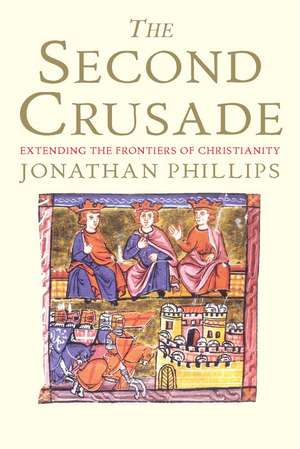The Second Crusade: Extending the Frontiers of Christendom
Autor Jonathan Phillipsen Limba Engleză Paperback – 20 apr 2010
The first complete account of Catholic Europe's onslaught on "unbelievers" in the 12th century
The Second Crusade (1145-1149) was an extraordinarily bold attempt to overcome unbelievers on no less than three fronts. Crusader armies set out to defeat Muslims in the Holy Land and in Iberia as well as pagans in northeastern Europe. But, to the shock and dismay of a society raised on the triumphant legacy of the First Crusade, only in Iberia did they achieve any success. This book, the first in 140 years devoted to the Second Crusade, fills a major gap in our understanding of the Crusades and their importance in medieval European history. Historian Jonathan Phillips draws on the latest developments in Crusade studies to cast new light on the origins, planning, and execution of the Second Crusade, some of its more radical intentions, and its unprecedented ambition. With original insights into the legacy of the First Crusade and the roles of Pope Eugenius III and King Conrad III of Germany, Phillips offers the definitive work on this neglected Crusade that, despite its failed objectives, exerted a profound impact across Europe and the eastern Mediterranean.
The Second Crusade (1145-1149) was an extraordinarily bold attempt to overcome unbelievers on no less than three fronts. Crusader armies set out to defeat Muslims in the Holy Land and in Iberia as well as pagans in northeastern Europe. But, to the shock and dismay of a society raised on the triumphant legacy of the First Crusade, only in Iberia did they achieve any success. This book, the first in 140 years devoted to the Second Crusade, fills a major gap in our understanding of the Crusades and their importance in medieval European history. Historian Jonathan Phillips draws on the latest developments in Crusade studies to cast new light on the origins, planning, and execution of the Second Crusade, some of its more radical intentions, and its unprecedented ambition. With original insights into the legacy of the First Crusade and the roles of Pope Eugenius III and King Conrad III of Germany, Phillips offers the definitive work on this neglected Crusade that, despite its failed objectives, exerted a profound impact across Europe and the eastern Mediterranean.
Preț: 134.76 lei
Nou
Puncte Express: 202
Preț estimativ în valută:
25.79€ • 26.100$ • 21.39£
25.79€ • 26.100$ • 21.39£
Carte disponibilă
Livrare economică 19 martie-02 aprilie
Livrare express 05-11 martie pentru 34.39 lei
Preluare comenzi: 021 569.72.76
Specificații
ISBN-13: 9780300164756
ISBN-10: 0300164750
Pagini: 336
Ilustrații: 12 b-w illus.
Dimensiuni: 156 x 235 x 23 mm
Greutate: 0.64 kg
Editura: Yale University Press
Colecția Yale University Press
ISBN-10: 0300164750
Pagini: 336
Ilustrații: 12 b-w illus.
Dimensiuni: 156 x 235 x 23 mm
Greutate: 0.64 kg
Editura: Yale University Press
Colecția Yale University Press
Notă biografică
Jonathan Phillips is Professor of Crusading History, Royal Holloway, University of London. He has published extensively on the subject, including The Crusades, 1095–1197 and The Fourth Crusade and the Sack of Constantinople. He lives in Berkshire, UK.
Recenzii
"[The Second Crusade] constitutes an important achievement. It synthesizes a great deal of previous scholarship while bringing new sources and new interpretations to the discussion. It fills a large historiographical gap with erudite precision."—Thomas F. Madden, Speculum: A Journal of Medieval Studies
"This account . . . will be valued by specialists because of its scholarly approach and by undergraduates and general readers because it is written in a clear and accessible style. . . . [A] brilliant analysis of the European situation in 1145 . . . Excellent."—John France, The International History Review
